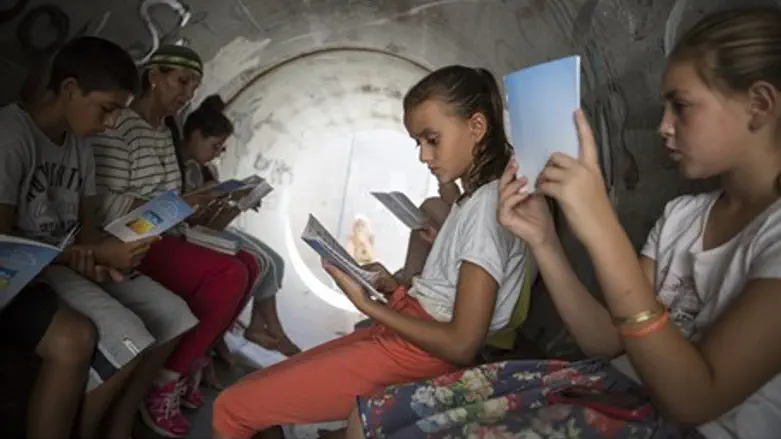
UNICEF Gaza Field Office chief, Pernille Ironside, held a press conference at the United Nations offices in New York City several days ago, "on the impact on children from the conflict in Gaza."
Unlike UNRWA - which is charged solely with attending to Palestinian "refugees" - UNICEF is the United Nations International Children's Emergency Fund and is charged with assisting children over the world.
Asked how she, and the entire UN Gaza staff, remained neutral in the face of Gaza children’s and civilian hardships, Ironside stated that, "There have been attempts to instrumentalize the UN in Gaza in this conflict."
"...There have been attempts [by Israel] to try to facilitate military operations against the [Palestinian] civilian population by facilitating the clearance of certain neighborhoods. The UN has refused to be a party to that," she added, admitting that Israel sought the UN’s help in clearing neighborhoods of civilians in advance of imminent Israeli military operations directed at terrorists and military targets embedded among civilians.
She explained that the Israelis had informed them through "text messages, phone calls, and leaflets from Israel," with "notice of some hours", but these were ignored, in effect placing responsibility on the UN for some civilian deaths.
Ironside described the state of affairs in Gaza, laying the blame for the difficult conditions on Israel, while ignoring Egypt's closing of its Gaza border, Hamas’ firing of rockets into Israel, its breaking every ceasefire and its attacks on Israel through tunnels. She did say that the "armed groups fighting Israel" had some responsibility to not involve children, but she did not mention that throughout the recent conflict, as can be seen in IDF reports. Israel has trucked tens of thousands of humanitarian supplies into Gaza.
Ironside spoke only of Palestinian Arab children, specifically referring to the children "of Gaza." She cited hundreds of deceased Gaza children, and thousands of injured as a result of the recent conflict, asking "How can we give the children of Gaza the stability they need, the peace they deserve?" She did not refer at all to the physical and psychological trauma suffered by Israeli children, who have endured more than a decade of rocket and mortar attacks on their communities. In some towns in southern Israel, for example, well over 50% of children suffer from Post-Traumatic Stress Disorder.
She focused on detailing how over 200 Gazan schools have been extensively structurally damaged, and 25 are no longer usable or completely destroyed, with the Gaza school year is slated to start of August 24th.
What she did not report was that since the beginning of the last cease-fire, the IDF reported that over 260 rockets had been fired from "educational facilities (schools)."
Schools in the south of Israel are subject to constant rocket barrages, with kindergartens targeted on several occasions, including just last Friday.
When asked why, relatively speaking, there are so many child casualities, Ironside described the demographic make-up of Gaza population, and its densely inhabited areas. She then explained that it is also a matter of defining categories - out of 1.8 Million Gazans, 1 Million or over 55% of Gazans are under the age of 18. If the category of "youth" is included, defined as "people under 30," she said it would be a "vast" percentage, not mentioning that both age groups include terrorist "youth" who likely make up most of the dead and injured.
When asked about UN facilities being used as weapons storage facilities, she responded, “News reports indicated that there were 3, I believe 3, UN schools in which rockets were found through a monitoring system. These schools were not, at the time, being used, but nonetheless they should never have placed any kind of weaponry in the schools, that’s a clear no-no.”
Ironside cited statistics that before the current conflict, 59% of the under 29 year-olds in Gaza were unemployed and 80% of all Gazans were dependent on aid. Israel has noted repeatedly, that for several years after the Six Day War, a railroad connected Gaza and Tel Aviv, with over 70,000 Gazan workers travelling to work in Israel every day, and many others setting up roadside stores to sell rattan furniture, for which Gaza was known, all over Israel . This all came to an end when the Gazans chose to support terrorist organizations.
Ironside claimed that when she signed up for this type of humanitarian work she was committed to an "unwavering commitment to remain impartial and neutral," and, that UN personnel "remind themselves of it every day."
Some may dispute that.